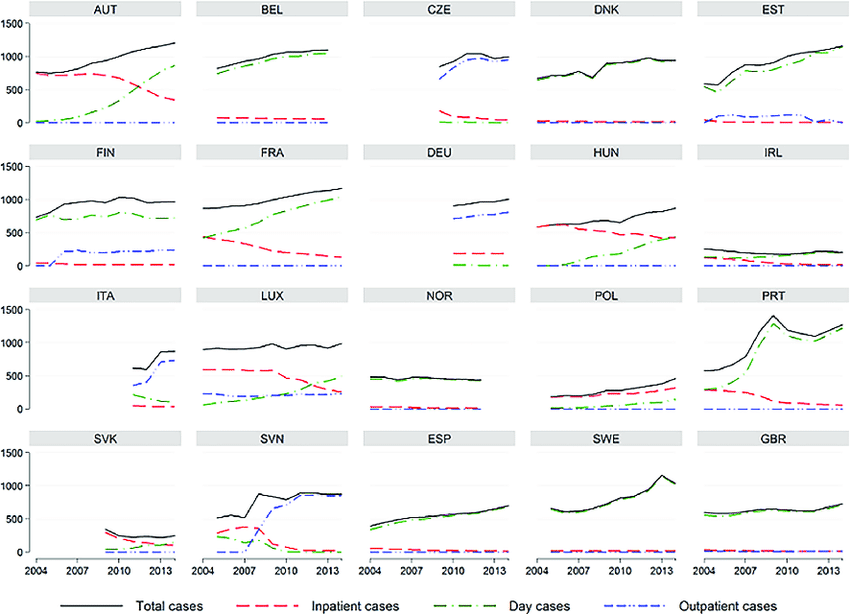
The Bundling & Un-bundling of Healthcare
When we think of modern healthcare, we think of massive hospital complexes resembling cities, worked by thousands of people in white coats. Modern tertiary acute care hospitals are the epitome of "bundled" healthcare. These state-of-the-art facilities can provide virtually every treatment, test, and procedure known to mankind.

Texas Medical Center; 9,200 beds, 106,000 employees, 10,000,000 patients
These hospitals can perform biblical miracles, bringing patients back from the brink of death. Big hospitals accomplish this by "bundling" everything together, creating an interdisciplinary organization with the goal of tackling every and any health issue known to man. Indeed, these hospitals are good at doing their mission; tackling complex health issues. But big hospitals can be literal nightmares for patients. Hours upon hours of waiting. Seeing a dozen different doctors who all provide different advice. Three different nurse to care for you each day. Endless papers to sign. And finally, the big bill hits the bank.
The "user-experience" is nightmarish in the world of bundled healthcare, and understandably so. You the patient (who generally has no foreknowledge of healthcare) are forced to navigate the most complicated industry known to mankind, all the while actively dying from disease.
But, not everything in healthcare is this way. Healthcare can be incredibly straightforward, simple and quick under the right circumstances. Imagine seeing the ophthalmologist on Monday for blurry vision and receiving cataract surgery on Wednesday from the same doctor. Or visiting your primary care doctor for a sore-throat and getting prescription antibiotics within the hour. These are fine example of "unbundled healthcare". Patients love unbundled healthcare because it provides quick and easy solutions to their problems, minus the hassle of dealing with healthcare bureaucracy.
Doctors love unbundled healthcare as well. They practice for the love of treating patients and solving problems for them, never for the sake of paperwork or hospital politics. Unbundling healthcare means unshackling doctors from a considerable amount of b*llshit. Furthermore, unbundled healthcare is generally more efficient because they focus on one or few things, and do them in high volume. No wonder doctors who practice in unbundled healthcare tend to earn more and have better lifestyles. Look no further than your local cataract doctor and knee doctor who leave the office by 4pm on sports cars.
Dying from disease is already bad enough, so can we make the process of curing it a little less worse for everyone? Can we unbundle healthcare?
Just like all things health, the answer is on a case by case basis. First, let's examine why we have bundled healthcare in the first place.
To start with, although big acute care hospitals usually have horrible user experience, they are still your best chance at survival if you have a serious life-threatening disease. Let's say you have cancer; heres a list of who and what you need to survive:
- Cancer doctor to coordinates your care
- Expensive imaging equipment, and appropriate staff
- Expensive lab equipment and appropriate staff
- Cancer surgeon and his team to perform surgery
- Surgical theater with appropriate equipment and team
- 24-hour intensive care for the first few days
- 24-hour on-call surgical team for revision surgery
- Rehabilitation specialists
- and more...
Oh, and you also have diabetes, hypertension, and kidney disease. And you are depressed from fighting cancer
- Renal department to consult
- Cardiology department to consult
- Diabetes department to consult
- Psychiatry department to consult
- Necessary staff and equipment for each specialty
Fighting serious illness is no easy task for modern medicine. It requires accurate, and most importantly, timely, treatments. These must be coordinated across multiple specialties, professions, and teams. It is simply more efficient (and also necessary) to provide everything at one location. Complexity is a necessary evil in our world.
So healthcare is complex, and rightfully so. But there are always ways to simplify complex problems. Just how do we unbundle healthcare and deliver value to patients?
Heres how. Healthcare can generally be divided into two categories; acute and non-acute. Simply put, unbundling is a no-go for acute care. If the patient needs a treatment/exam/procedure within the hour, it must be done on site and in coordination with other processes. The vast majority of the things on your "cancer survival list" fall in the acute category. You need intensive care, you need labs and imaging, you need 24-hour consult services in case you get an AKI.
For non-acute care, it's a whole different story. Let's return to the topic of cataract surgery. Cataract is a non-life-threatening disease. It has a slow progression across many years. It is only affects the eye, which is also conveniently exposed. This means you can wait for cataract treatment, you only need one organ specialist to treat you, and you don't need invasive surgery. This is why cataract surgery is almost exclusively done in outpatient surgical centers and clinics, and not in big bundled hospitals. Cataract surgery is astronomically more efficient to perform in high volume specialized outpatient centers than as an inpatient. Voila, unbundled healthcare; greater efficiency, satisfied patients, happier doctors.

In nearly every country, outpatient > inpatient with a growing gap
(source: https://doi.org/10.1371/journal.pone.0192620.g002)
But not all things are like cataract... right? Actually, there are a lot of things considered "acute" by traditional medicine, which are in fact, not.
Take for example, heart catheterizations. These highly technical procedures used to be done in a rush, therefore within the relative safety of large hospitals. It turns out, most patients who needed catheterization didn't need to do so acutely. Now given the advance in catheter technology and understanding of appropriate treatment timeframe, these procedures can be done as outpatients at specialized facilities. Unbundled from complexity, catheterizations are now safer, cheaper, and quicker.

Catheterization is moving from hospitals to outpatient centers
Medicine and healthcare is a slow-moving industry. Thus there is always "alpha" to be made by being the first mover. There are countless other exams, procedures, treatments, etc. that can be safely unbundled from mega-hospitals. All of these "unbundlings" individually represent multi-million to multi-billion dollar business opportunities.
The unbundling of healthcare is only a recent trend. The general direction of medicine for the 20th century was bigger is better and more is better. But now it seems healthcare is becoming too complex, even for healthcare itself. Patients, providers, and insurers are looking for means to simplify things. Unbundling healthcare from big hospitals represent a massive opportunity to satisfy everyone involved.
On a side note, there is also a new trend of bundling on the rise; let's call this "neo-bundling". What if your primary care doctor, who was until then only able to provide you with medicine and half-hearted advice, could also prescribe you diets and exercise? What if your family doctor could work with nutritionists and therapists to provide you with truly holistic care? What if your heart doctor, lung doctor, kidney doctor, and dentist could all be on the same page? These are examples of a new age of bundling in healthcare. By combining healthcare in creative and convenient ways, one can create endless opportunities to better treat patients.
There is massive unmet demand for this type of healthcare. Most of our medical problems arise from non-medical problems. Bad habits, bad diet, lack of exercise, lack of education, and other societal constraints all contribute to our medical issues. A lot of people are sick from multiple co-morbidities. By combining social interventions with medical ones, or by aligning multiple disciplines, there is massive patient benefit to be realized. This is why we need a "neo-bundling" of healthcare, not the old model that requires patients to self-navigate a labyrinth of hospital corridors.
The consumer always wins. Despite healthcare's resistance to change, the aforementioned trends represent massive opportunities to deliver value to patients, ergo, consumers. As such, these trends will continue to grow and become more evident as time passes. It is only a matter of how and when to join the great unbundling ( and bundling).
この記事が気に入ったらサポートをしてみませんか?
